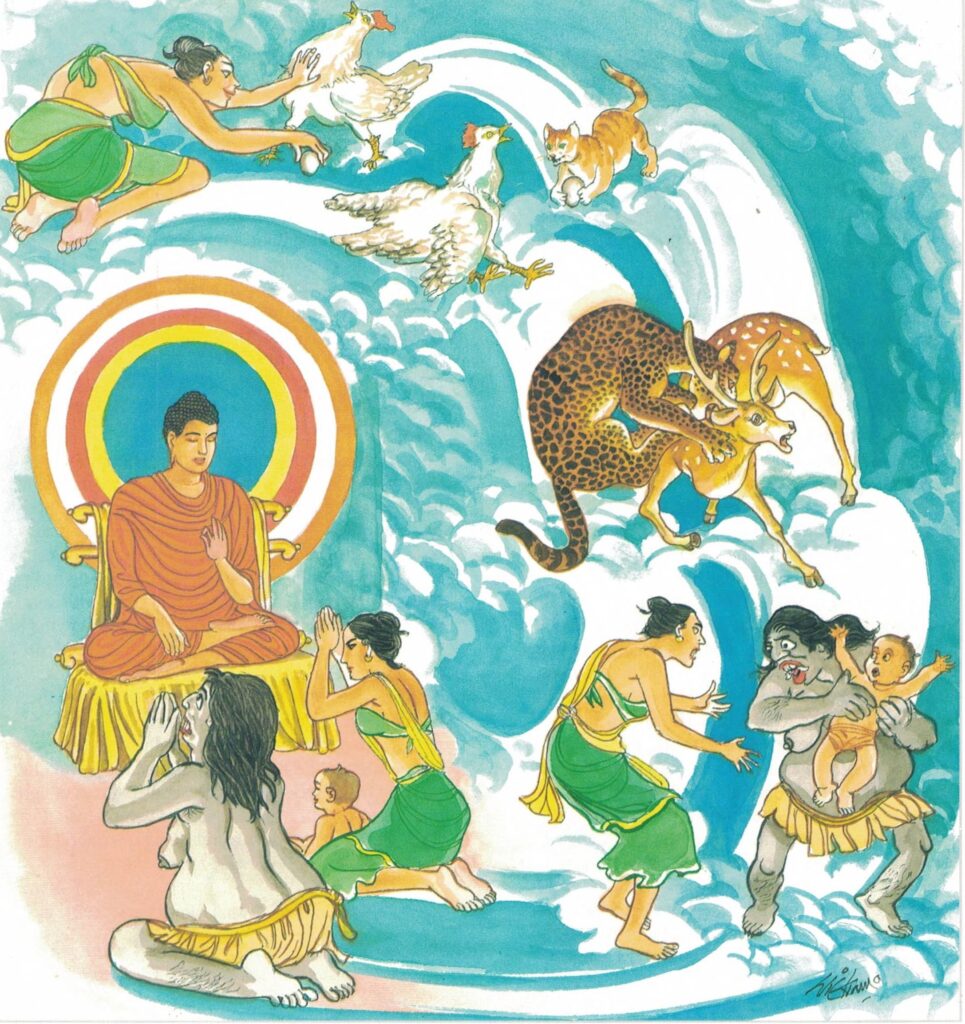Pali text, illustration and English translation of Dhammapada verse 291:
paradukkhūpadānena attano sukham icchati |
verasaṃsaggasaṃsaṭṭho verā so na parimuccati || 291 ||
291. Whoso for self wants happiness by causing others pain, entangled in anger’s tangles one’s from anger never free.

The Story of the Woman Who ate up the Eggs of a Hen
While residing at the Jetavana Monastery, the Buddha spoke this verse, with reference to a feud between a woman and a hen.
Once, there lived a woman in a village near Sāvatthi. She had a hen in her house; every time the hen laid an egg she would eat the egg. The hen was very hurt and angry and made a vow to have vengeance on the woman and made a wish to be reborn as some being that would be in a position to kill the offspring of that woman. The hen’s wish was fulfilled as it was reborn as a cat and the woman was reborn as a hen in the same house. The cat ate up the eggs of the hen. In their next existence the hen became a leopard and the cat became a deer. The leopard ate up the deer as well as its offspring. Thus, the feud continued for five hundred existences of the two beings. At the time of the Buddha one of them was born as a woman and the other a female spirit.
On one occasion, the woman was returning from the house of her parents to her own house near Sāvatthi. Her husband and her young son were also with her. While they were resting near a pond at the roadside, her husband went to have a bath in the pond. At that moment the woman saw the female spirit and recognized her as her old enemy. Taking her child she fled from the female spirit straight to the Jetavana Monastery where the Buddha was expounding the Dhamma and put her child at the feet of the Buddha. The female spirit who was in hot pursuit of the woman also came to the door of the monastery, but the guardian spirit of the gate did not permit her to enter. The Buddha, seeing her, sent the Venerable Ānanda to bring the female spirit to his presence. When the female spirit arrived, the Buddha reprimanded both the woman and the female spirit for the long chain of feuding between them. He also added, “If you two had not come to me today, your feud would have continued endlessly. Enmity cannot be appeased by enmity; it can only be appeased by loving-kindness.”
He who seeks his own happiness by inflicting pain on others, being entangled by bonds of enmity, cannot be free from enmity.
At the end of the discourse, the female spirit took refuge in the three gems, viz., the Buddha, the Dhamma and the Sangha, and the woman attained sotāpatti fruition.
Explanatory Translation (Verse 291)
paradukkhūpadānena attano sukhaṃ icchati,
verasaṃsaggasaṃsaṭṭho so verā na parimuccati
paradukkhūpadānena: if by inflicting pain on others; attano [attana]: someone; sukhaṃ [sukha]: happiness; icchati: desires; verasaṃsaggasaṃsaṭṭho [verasaṃsaggasaṃsaṭṭha]: who is contaminated by the touch of anger; so: he; verā: from anger; na parimuccati: will not achieve release
The individual who achieves happiness by inflicting pain on others is not freed from anger because he is entangled in the web of anger due to contact with the anger of other people.
Commentary and exegetical material (Verse 291)
so verā no parimuccati: A desirable object leads to attachment whilst an undesirable one leads to aversion. Verā is the great fire that burns the whole world. Aided by ignorance, these two produce all the suffering in the world.
khanti: patience or tolerance. Khanti is the antidote to anger. Khanti (forbearance) is one of the perfections practiced by the aspirant Buddha.